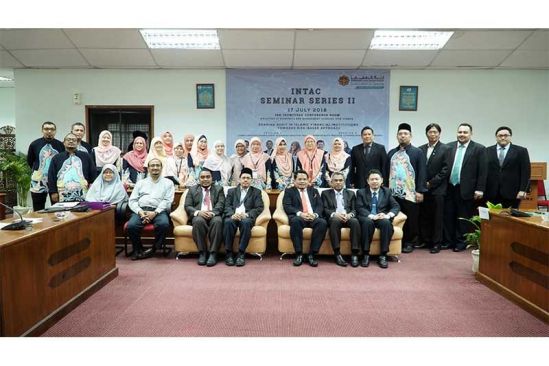There is an urgent need for Shariah Committee members to ask relevant questions to Board of Directors, management and organs of compliance to ensure that Shariah compliance is observed.
Speaking at the INTAC Seminar Series II (INTAC 2018) on a topic of “Comply or Face Consequences: A Shariah Sensitive Test” recently, Datuk Dr Mohd Daud Bakar, executive chairman of Amanie Group, stressed that relevant questions may cover areas such as charity money that is tainted income that needs to be disposed of at the end of the year.
“Shariah Committee members may inquire on the formula used to calculate the tainted income and how quick was the tainted income being disposed of. Communication is also important between Shariah Committee and Board of Directors as currently, there is no formal communication between these two major organs of Shariah compliance.”
“Board of Directors should also have the skill to ask relevant questions to Shariah Committee members, for instance on deliberation of new product approval, whether it was conducted through email communication or meticulous review and face-to-face discussions,” he added.
Dr Mohd Daud also stressed on the importance for Islamic financial institutions to move beyond compliance to be more visible and transparent in providing information to the public.
It is not just meeting the requirement to ensure Shariah compliant in products, people, system and environment. What more is that Islamic financial institutions must be seen as ‘whiter than white’ and be able to articulate the reason behind Shariah compliance and non-compliance.
He challenged the Islamic financial institutions to move forward in achieving higher standard of compliance and disclosure so that Islamic financial institutions become more respectable and more appreciated by the stakeholders.
This is in line with the Integrated Reporting initiative which advocates reporting beyond financial information to include social and sustainability issues. It is expected that the more Islamic financial institutions follow Integrated Reporting, the higher the value of the company as they are more transparent and visible of best practices.
Before concluding, Dr Mohd Daud reiterated on how important it is for MIA to develop the Competency Framework for Shariah auditors. MIA has already formed an Islamic Finance Committee which deliberates on this matter.
“Further work need to be done by having industry players and stakeholders providing inputs for the development and implementation of this competency framework. It is imperative for Islamic financial institutions to have competent Shariah auditors with relevant knowledge and skill-set. Shariah audit is about having an auditing framework that is not about ‘fatwa auditing’ but it is about process auditing. It is about to have an auditor who can do audit and know about Shariah compliance of process and activities of the Islamic financial institutions.”
In the presentation, he also highlighted on three possibilities of comply or face consequences which makes Shariah sensitive test highly dependent on the quality of human capital. The possibilities are:
i. Gross Negligence: a situation when there is limited time for organs of compliance (i.e. Product Approval and Risk Committee) to properly vet and review documents for product approval and assess for Shariah non-compliance issues.
ii. Deliberate Negligence: a situation when Shariah compliance review has been performed and Shariah non-compliance issues were found but it was decided to conceal and not disclose the non-compliance.
iii. Duty of Care, Skills and Diligence: a situation when ample time is spent on performing Shariah compliance review but no non-compliance issues could be found. It is not because the product is not Shariah compliant but the Shariah auditors are not qualified to assess the non-compliance issues.
INTAC 2018 was organised by the Department of Accounting, Kulliyyah of Economics and Management Sciences (KENMS), International Islamic University Malaysia (IIUM), supported by the Malaysian Institute of Accountants (MIA), on the topic of ‘Shariah Audit in Islamic Financial Institutions: Towards Risk Based Approach’.
A total of 94 participants registered for the seminar, namely practitioners from Islamic banks in Kuala Lumpur, academics and post-graduate students. The main objective of the program was to provide a platform for the practitioners, academicians and students to discuss on the need to revisit the current Shariah audit practices as to whether this is only for compliance audit or risk-based audit as being practised in the internal audit.
Participants also discussed on the importance to have effective Shariah risk management when there is a risk-based audit in Islamic financial institutions.
In the welcoming remarks, Prof. Dr. Hassanuddeen Abd. Aziz, the Dean of KENMS acknowledged the presence of distinguished speakers and participants to this seminar as a platform to gather Muslim minds and promote enhancement knowledge in Islamic finance.
This seminar was officiated by Salihin Abang, President of Malaysian Institute of Accountants (MIA).
In his speech, he addressed on the current initiative by MIA to develop the competency framework for Shariah auditor. He also highlighted on the need for Shariah audit and why it needs to be implemented using the risk-based approach.
“Shariah audit provides the assurance of Shariah compliance, hence providing the emotional and psychological comfort for stakeholders. It is crucial for Shariah auditors to enhance their understanding on risk based Shariah audit approach to be able to identify the risks that has potential impact on Islamic financial institutions.”







